|
Heading "Down
East", Maine, USA 15th
July - 7th August 2005 |
|
Like many cruisers before us, we entered the
waters of Maine with a sense of trepidation, having been warned of the
perils of frequent fog, abundant lobster pots and harbours overrun with
mooring buoys, leaving no room for visitors wishing to anchor.
Whatever the drawbacks of visiting the state of Maine by sea may have been,
they were a small price to pay to experience the rugged beauty of the rocky
coastlines, the tranquil out-of-the-way anchorages we shared only with
seals, porpoise, ospreys and the occasional lobsterman and to cycle the
quiet leafy lanes coloured by a multitude of summer wildflowers.
We soon acquired the knack of dodging the
clusters of lobsterpots, to avoid tangling their lines in our propeller.
Once we became proficient at this slalom, as we headed further "down
east" and the tidal currents became stronger, we found that the
lobstermen added additional jeopardy by joining their floats together with
long lines, now using two or more floats to mark each lobsterpot, leaving
the helmsperson to make a split-second decision on which of the approaching
buoys were joined together. The ultimate challenge,
however, came in Muscongus Bay where we found the buoys laid so closely
together that it was impossible to find a clear path between
them. Our only safe option was to cut the motor and sail
right through them and luckily we actually had enough wind to do just that.
|
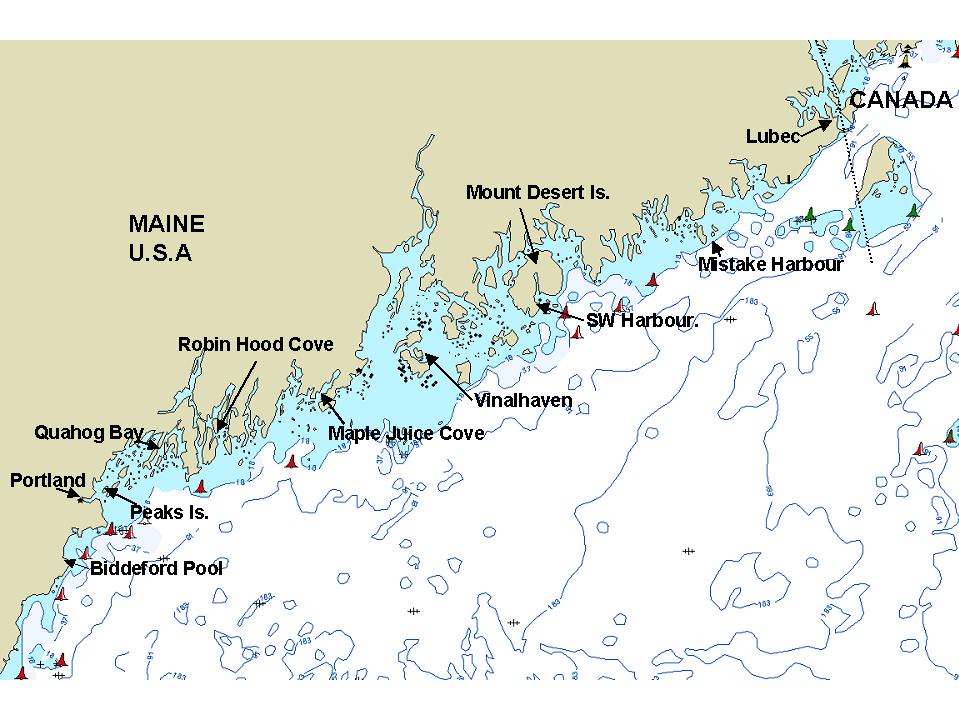
|
|
On our way to the Ocean Cruising Club rally in
Maine, our first stop was in Biddeford Pool, primarily to buy diesel at the
yacht club there. Luckily before we filled our jerry cans at the
dock, the dock master advised us that the price for diesel was $4 a gallon
compared to the usual price of around $2.30 so we quickly
reconsidered. Our visit to Biddeford Pool gave us the chance to
visit the nearby nature trail provided by Audubon, the American
bird-watching society. With our normal skill at bird-watching,
we didn't spot many feathered-friends and at times the undergrowth became so
boisterous it was hard even to spot each other, but the walk was very
enjoyable and gave us our first taste of the stunning coastal scenery.
|
|
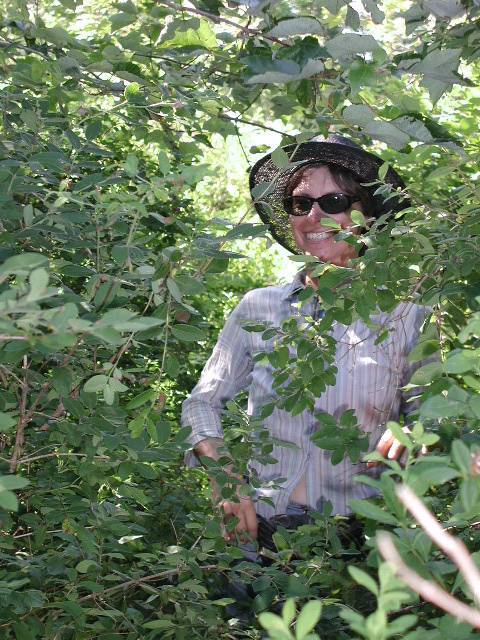
Audubon Nature Trail - what
trail?!
|
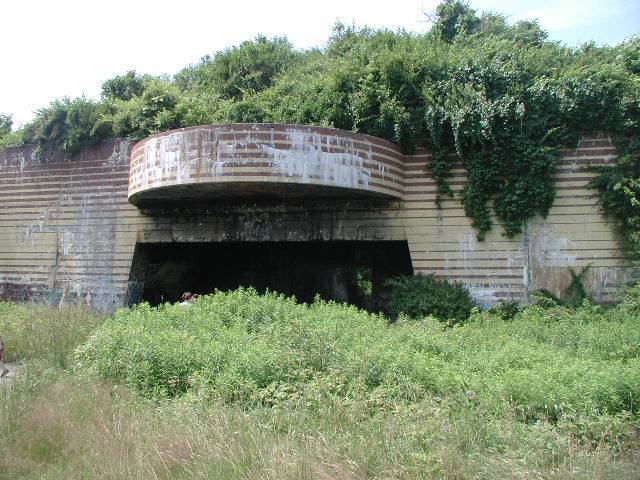
Peaks Island Surreal
Battery Ruins
|
|
Early next morning we made an unplanned stop in
Portland, the area's only real major town, to pick up fuel at a much more
reasonable price, before heading across the bay to anchor at nearby Peaks
Island, instead of in the hustle and bustle of the busy town
harbour. From Peaks the hourly ferry service, which at the time
was under heavily armed Coastguard protection as a result of the terrorist
attacks in London, allowed us to pay a visit to the "big
city".
We also circumnavigated peaceful Peaks Island
on our trusty bikes, enjoying the views from the coastal road.
We made a stop at the "Battery Nature Reserve" to discover, deep
in the undergrowth, the amazing ruins of an old gun battery, where we took a
spooky stroll through the quarter of a mile long underground tunnel in near
pitch dark. On our way back to Anju we spotted a sign at the
local library advertising a book sale. We decided that after
our visit to the library book sales in New York, the last thing we needed
aboard was more books, until we discovered that the sale had actually
finished and all remaining books were free for the taking.
Needless to say, we added to Anju's book ballast.
Another of Maine's perils, dense fog, was
forecast for a couple of days, so we decided to pick a quiet, secluded
anchorage in Quahog (pronounced Co-hog) Bay for some R &
R. This gave Phil the chance to try his hand at fishing
for striped bass. Having established that no licence
was required and that specimens between 20 and 26 or over 40 inches long
could be kept, he disappeared into the fog with his tape measure and fishing
rod and returned with a delicious dinner!
|
|
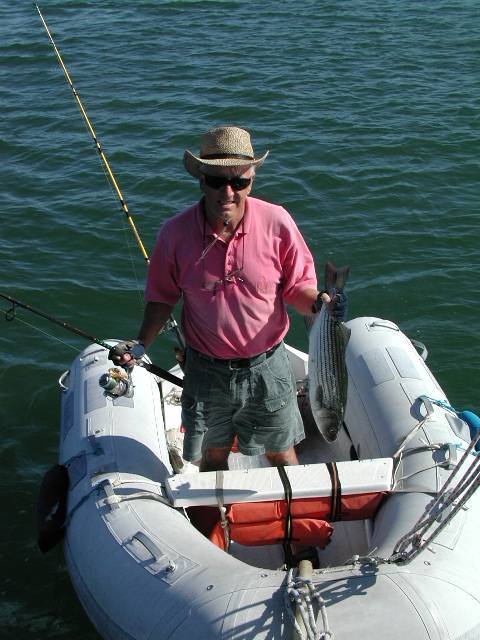
One of Phil's
"Striper" fishing successes (on a less foggy occasion!).
|
All the gourmet cooking quickly exhausted our
new, puny, American gas bottles, so we had to track down a place to refill
them. The nearby marina told us that U-Haul, "only
about 10 minutes down the road", would be able to refill our bottles,
so off we set by bike, each with a gas bottle in our backpack, for the
"10 minute" trip to Brunswick.
Six miles later, after an unpleasant trip
along a hilly, busy main road, we found a U-Haul depot, only to be told that it was a
different U-Haul we needed, another quarter of a mile further
on. By now we were skeptical of car-drivers' judgment of
distances but were relieved to find the depot was not much
farther. On arrival we were told that their propane refill
machine wasn't currently working. By now we were hot, flustered and
pretty bad-tempered but the U-Haul manager kindly tracked down another gas
depot for us and called a taxi for us to make the four mile
trip. A lucky stroke of fate brought along a station-wagon
as our taxi, large enough for our bikes to fit in the back, so after
refilling the gas bottles, we decided to take the taxi all the way back to
the marina, making our ten pounds of propane incredibly expensive!
|
|
When the fog finally lifted, we continued our
trip down east to the venue of the Ocean Cruising Club Rally, Robin Hood
Cove, arriving a couple of days early in case of further
fog. This gave us time to get acquainted with the staff of
the Robin Hood Marine Centre, who very generously even allowed us to use the
marina's courtesy car to make a run to the nearest town, Bath, about six
miles away, to pick up supplies.
We spent the time fishing and exploring the
bay by dinghy. One morning we had a visit from locals Mike
and Gloria Gaffney who were passing by in their boat, after checking their
lobster pots. Not only did they generously give us a
couple of lobsters from their catch, they also schooled us in how to cook
them and get all of the meat out of the shell. Their
lessons definitely helped as it was our first experience of preparing Maine
lobsters and the finished result was delicious.
|
|
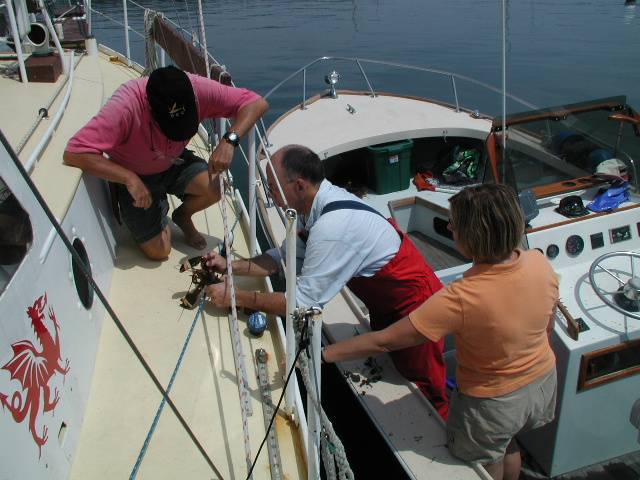
Mike and Gloria tutoring
Phil in lobster preparation.
|
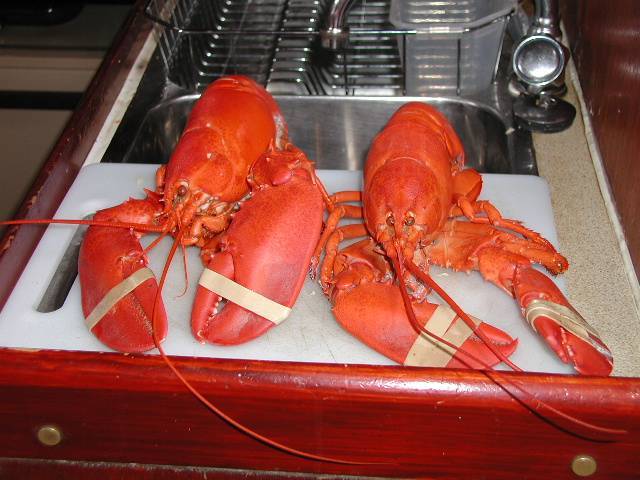
The steamed lobsters, ready
to eat.
|
|
Slowly other OCC boats arrived in the bay,
"William Baron" first, giving us the opportunity to get to know
Norfolk, Virginia's Port Officers, Greta and Gary. Despite the
threat of thunderstorms the OCC cocktail party was fun and well attended and
several of the participating boats decided to continue the get together over
the weekend with a small cruise of the area.
|
|
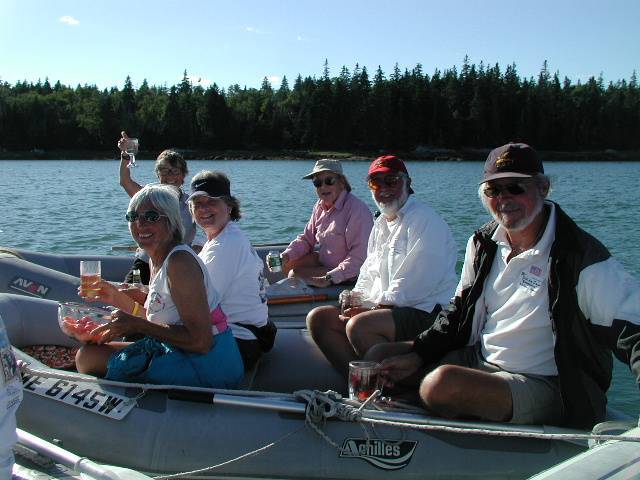
Dinghy Drifting at
Vinalhaven
|
Next day we gathered at happy hour in Maple
Juice Cove for a dinghy drift, a type of cocktail hour that is common
amongst cruising boats when there are too many people attending to be
accommodated aboard one boat. Everyone met in their dinghies at the
stern of the organiser's boat, the dinghies were rafted together and nibbles
passed around from dinghy to dinghy. It was great to meet the
American OCC members, many of whom generously invited us to visit on our way
south.
On Sunday Peter, the local Port Officer for
Maine, selected the beautiful venue of Vinalhaven Island.
Local knowledge certainly paid off and we found ourselves in Seal Harbour,
an almost land-locked and very well protected anchorage, which must normally
have been very peaceful when not invaded by a fleet of eight OCC yachts for
a party!
|
|
We bade farewell to the other OCC boats and
headed for South West Harbour on the island of Mount Desert, most of which
is a National Park. Our trip was going well, we had plenty
of wind and were sailing exceptionally well even with reefed mainsail and
genoa. We even congratulated ourselves on even sailing without the aid
of the motor through a narrow channel between several rocks and islands,
requiring several tacks. Perhaps they would make proper
sailors of us yet!
As we approached a narrow channel across a
rocky bar at the south of Mount Desert Island, we spotted a thunderstorm
heading towards us and decided it would now be prudent to engage the motor
and reef the genoa a little more. As it transpired this was a
very wise decision because suddenly in a gust of wind preceding the storm
there was an ear-splitting bang and the whole boat seemed to
shake. We looked upwards in horror to see our roller furler and
forestay at the front of the boat broken right through, leaving the mainmast
only supported at the front by the partially reefed sail and its
halyard. It was time for urgent action to save the rest of the
rig, which could easily have been lost if it came under pressure from the
wind!
|
|
Luckily most of the genoa was already rolled
around the furler but the remaining section was now flogging in the wind and
obviously couldn't be rolled in. Neither could we drop the sail
as the halyard was the only thing holding the whole furler
up. As Christine steered the boat to get the wind out of
the sails, Phil somehow managed to manually roll the sail around the broken
furler and secure it with sail ties. The mainsail was then quickly
dropped and secured, taking the remaining pressure off the rig.
To better support the mast we took two spare halyards forward to the
bowsprit, so the pressure wasn't on the poor genoa halyard and sail
alone. Now we just had to make our way safely to port through the
thunderstorm, in practically zero visibility, with the loose forestay
swinging around alarmingly in the swell!
An hour later, once we were finally safely
anchored in South West Harbour, we reflected on how lucky we'd been that
this hadn't happened days out from port or in a rough sea.
It was time to put our Pantaenius insurance policy to the test for the first
time since we've owned Anju. We contacted Tracy at
Pantaenius by phone and her first concern was that all the crew were fine
with nobody injured, which was reassuring after such a bad
morning. We were told not to worry and to get an estimate
for repairs to the boat and e-mail it to them.
|
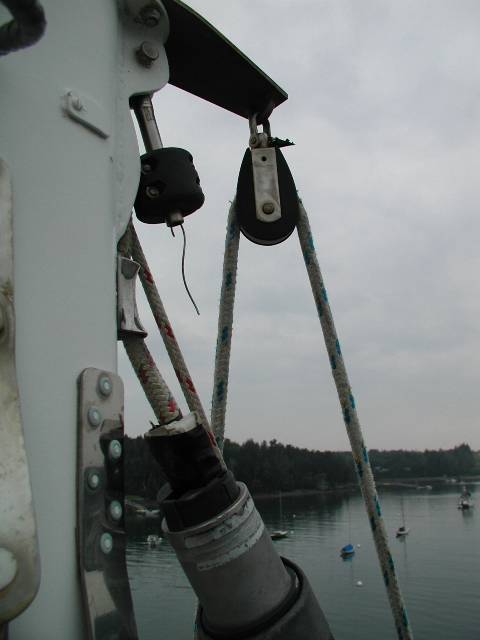
Anju's broken forestay and
roller furler supported just by the halyard and reefed sail.
|
|
Based on local recommendation we were able to
quickly track down rigger, Jim, from Indalo Marine, who was actually a Brit
living locally. He quickly diagnosed that we'd need to replace
both the forestay and the furler and check over the rest of the standing and
running rigging for damage. His estimate for repairs was
sent to Pantaenius and the go-ahead from the insurers was given the very
next day, allowing us to get the necessary parts on order immediately.
|
|
OCC friends George and Nancy from Trumpeter,
with whom we'd spent time at the Bahamas rally they organised, were in town
and put us in touch with another member, Bob Zinn, who kindly lent us a
mooring ball on which to tie Anju whilst we awaited the
repairs. Now all we could do was enjoy the beauty of
Mount Desert Island and the company of our local guides George and Nancy
while we waited.
Together we enjoyed a dinghy ride to North
East Harbour across the bay, a local concert which was part of South West
Harbour's centennial celebrations and dinners aboard each other's
boats. It was great to be able to spend more time with them after our
attendance at their Bahamas rally was cut short by our head gasket
problem.
|
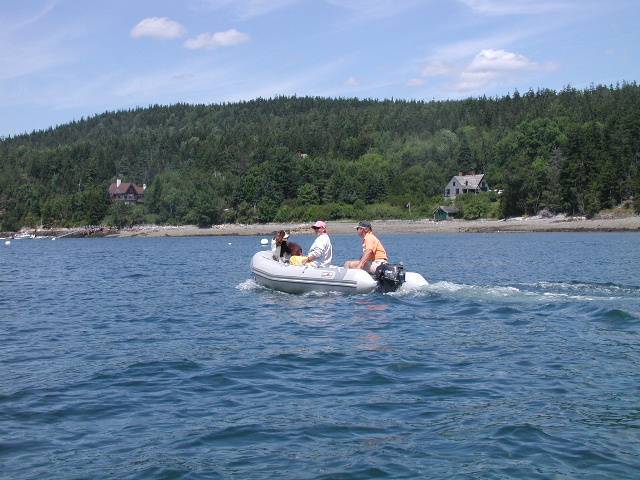
George, Nancy and Cady lead
the way to North East Harbour
|
|
We found the people of Maine to be very generous
and welcoming, another example of this being the day we stopped at a house
advertising fresh garden herbs and salad for sale, to enquire if they had
any coriander plants (known locally as cilantro). We'd been looking
for one for a while due to our fondness for curry. The
lady of the house told us that she normally only sold cut herbs but then
proceeded to get a trowel, dig up a plant from her garden, plant it in a pot
for us and give it to us to take away! Meanwhile her husband
proudly gave us a tour of their beautiful garden which must have taken many
hours of work each week. We wondered what kept them busy in the
cold winter and were told that they love cross-country skiing and ice
fishing. We decided we better not leave it too long before
heading south! We were already finding it cold even in the
summer, the tropics must have thinned our blood. With Anju's bare
steel hull sitting in sea water with a temperature of 8 to 10 degrees
centigrade, plenty of condensation was forming in our bilges and we'd had to
invest in rugs to keep our feet warm!
|
|
Most of Mount Desert Island is part of the
Acadia National Park, which provides a free bus service around the island to
cut down traffic. Using the free buses we were able
to widely explore the island and take some hikes, including the challenging
Beehive trail. As we stepped from the bus and looked
upwards we commented on some crazy people hauling themselves up an almost
vertical rock face. Only a few minutes after muttering the
words, "There is no way we're going up there", we threw caution to
the wind and joined the other crazies scrambling up the rocks with the help
of steel rungs provided by the Park Service. As we climbed
we wondered about our sanity especially as we both dislike heights but with
much encouragement of one another we managed to make it to the top to enjoy
the views and our picnic lunch. It was a great sense of
achievement for two crazy people!
|
|
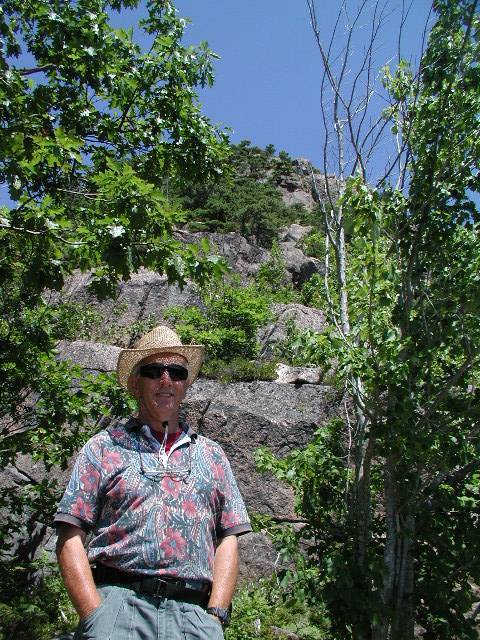
"There is no
way........
|
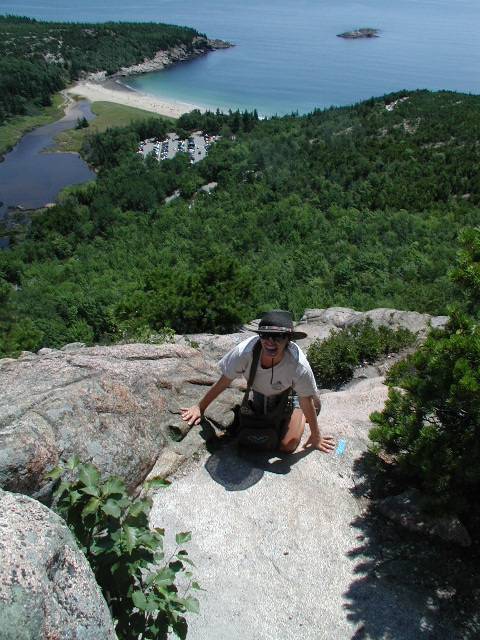
......we're going up
there!"
|
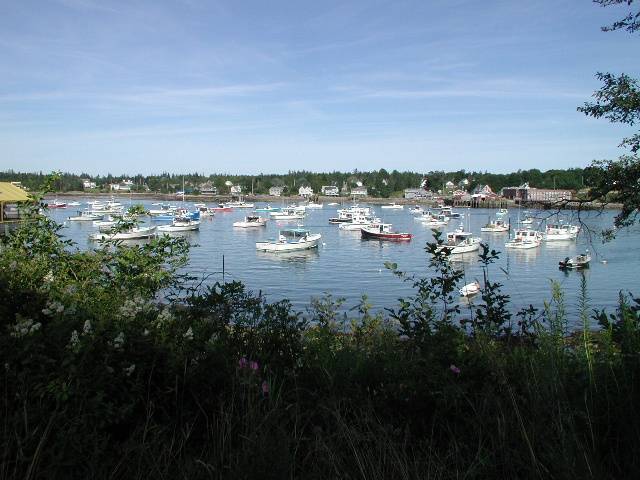
The lobster fleet in Bass
Harbour.
|
In no time at all we had to move Anju around to
Bernard in Bass Harbour for Jim and Marilyn from Indalo to start work on the
repairs. Of course we arrived in dense fog and then
had to pick our way through the fleet of lobster boats to our spot on a dock
at the back of the harbour. Jim and Marilyn set to work getting the old
furler down and making the new forestay and assembling the new Schaeffer
furler. The fun part was getting the 44 foot assembly from
their workshop half a mile down the narrow leafy lanes to the boat!
On inspecting the rest of the rigging they
found that a section of the backstay had to be replaced too, as it had
cracked with the stress and a couple of ropes had been damaged in addition
to the genoa halyard. All the repairs were carried out quickly
and efficiently by the family team and we were extremely grateful to our
insurers Pantaenius for their prompt and efficient response.
|
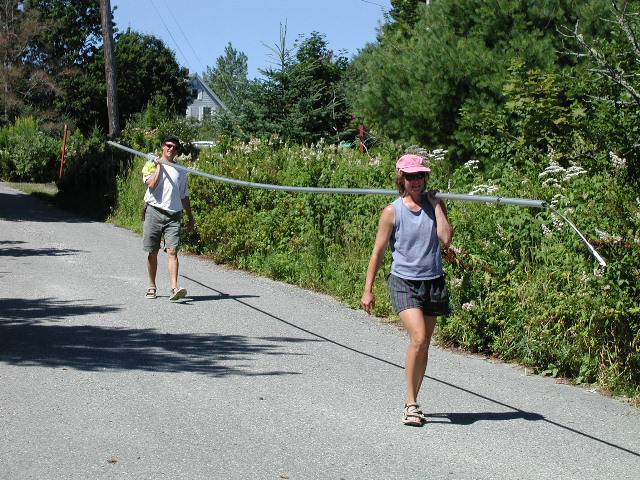
Jim and Marilyn delivering
the new furler
|
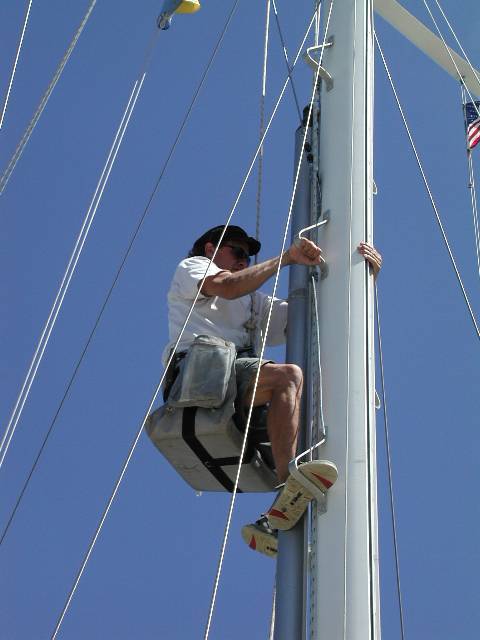
Jim heading up the mast to
fix it in place
|
|
In only three days the work was finished and
payment arranged by Pantaenius. Although paying our £2000
deductible contribution was painful, we were just happy to get everything
fixed so quickly and efficiently and to be able to get back to
sea. The sailing season in Maine is so short, it would have been
a shame to be held up for repairs.
Our next goal was to head for the Canadian
border, so we headed for Lubec, the easternmost town in the USA taking
advantage of the strong tidal currents of the Bay of Fundy on our
way.
|
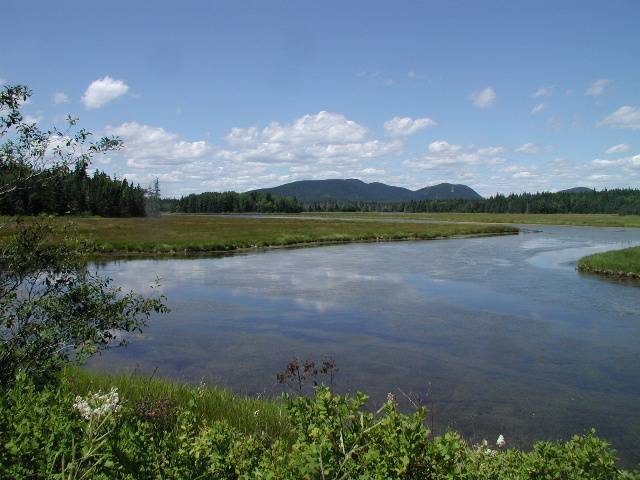
Mount Desert Island near
Bass Harbour
|














